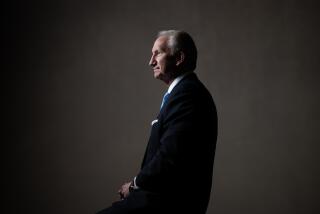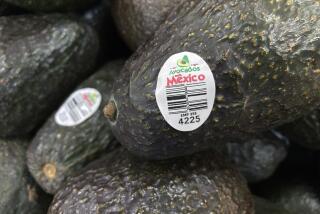Mosbacher Says He’ll Use ‘Levers’ to Open Markets
Commerce Secretary Robert A. Mosbacher said Monday that the United States is preparing to respond to unfair trade barriers in Japan and other countries with a broad range of actions, rather than words alone.
“We’re saying that if someone doesn’t open their markets, we have to find some way to make them--no, I mean encourage them--to open their markets,” Mosbacher said in an interview with The Times.
“I think we have to take a holistic approach when we deal with other nations,” said the former Houston oil producer, noting that this country has “a lot of possible levers” for dealing with recalcitrant trading partners.
“A lot of these (levers) are tied in with other relations with these countries,” he said in an apparent reference to defense. He continued: “You can think of the whole spectrum of ties we have--with our allies.”
Upbeat Tone
Mosbacher was interviewed in a conference room on the 51st floor of the Bank of America building downtown--a property that was bought by a Japanese developer in 1986. The Cabinet secretary, 61, is a longtime Bush confidante whose energy business survived the industry bust that brought down many other wildcatters.
For much of the conversation, Mosbacher was upbeat. He said, for instance, that America was becoming more competitive, and that U.S. quality had improved in automobile, steel and other industries. Trade with Japan, he maintained, was moving “in the right direction.”
At the same time, he offered Japan an unusual compliment: “The Japanese, who I admire tremendously, are probably the best traders in the world as far as being able to procrastinate opening markets without being illegal, impolite or immoral.”
In that vein, he pointed to trade problems that continue to trouble the United States, including a lack of success in selling supercomputers, rice and semiconductors to Japan.
“We’ve had very little in the way of orders for these supercomputers,” he said of the highly advanced U.S. machines capable of 1 billion math calculations per second. The Japanese, he said, “don’t have equivalent alternatives in their own production.”
Mosbacher was traveling in Southern California for meetings with business executives in which he sought to rally support for President Bush’s proposal to cut the capital gains tax.
Speaking to the San Diego Chamber of Commerce, he said such a tax cut would stimulate long-term investments and, ultimately, U.S. exports. It also would translate to greater trade in the Pacific Basin and other regions, he maintained.
Mosbacher was scheduled to meet later with 70 Los Angeles business leaders in a private event sponsored by Town Hall, a nonprofit forum for public affairs.
In the interview, he spoke of a planned “competitiveness initiative,” designed to help U.S. industry make further gains in the global marketplace.
While his plan is not complete, Mosbacher said it would include an emphasis on quality awareness. A new national award program to honor firms that maintain top standards--named for former Commerce Secretary Malcolm Baldrige--might be expanded significantly.
In addition, he said he might propose easing antitrust restrictions that limit the ability of U.S. firms to cooperate on such new technologies as high-definition television, superconductivity and electronics.
Mosbacher also suggested that the Bush Administration hopes to develop a trading partnership with Mexico that mirrors the new free trade agreement between the United States and Canada.
“We’d all like to move in that direction,” Mosbacher said. “I think the long-term prospects are pretty good.” But he acknowledged that due to various “socioeconomic reasons . . . it will take a lot longer” to negotiate a similar trade relationship with Mexico.
Times staff writer Greg Johnson in San Diego contributed to this story.
More to Read
Inside the business of entertainment
The Wide Shot brings you news, analysis and insights on everything from streaming wars to production — and what it all means for the future.
You may occasionally receive promotional content from the Los Angeles Times.










